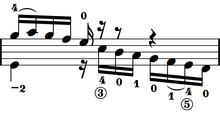Musical technique
Musical technique is the ability of instrumental and vocal musicians to exert optimal control of their instruments or vocal cords in order to produce the precise musical effects they desire. Improving one's technique generally entails practicing exercises that improve one's muscular sensitivity and agility. Technique is independent of musicality.
To improve their technique, musicians often practice fundamental patterns of notes such as the natural, minor, major, and chromatic scales, minor and major triads, dominant and diminished sevenths, formula patterns and arpeggios. For example, triads and sevenths teach how to play chords with accuracy and speed. Scales teach how to move quickly and gracefully from one note to another (usually by step). Arpeggios teach how to play broken chords over larger intervals. Many of these components of music are found in difficult compositions, for example, a large tuple chromatic scale is a very common element to classical and romantic era compositions as part of the end of a phrase.
Heinrich Schenker argued that musical technique's "most striking and distinctive characteristic" is repetition.[1]
Works known as études (meaning "study") are also frequently used for the improvement of technique.
Observations
In at interview at the Kronberg academy Mstislav Rostropovich was asked the following question directly about whether musicality and musical technique are separate issues to be worked separately "Do you think that in teaching repertoire and technical issues, they should be separate things, or did you always combine both things working musically and technically at the same time?" Rostropovich responded with the following (partial quote, see video link below for full answer to question) "...if you know which kind of sound you must produce for this composition, your muscles automatically play what is needed for that. Because your brain, dictates to your muscles much better than your teacher dictates to you. Sometimes of course I must make something technically more precise, but most important, your idea, how you must play in your brain."
Alexander Markov is quoted as saying "See I always felt about the music and the technical aspect of it, to it's very much together, I know some violinists some musicians who isolate the technical aspect of playing violin from the music itself, but to me they work hand in hand so much. So for example, the more I get involved musically the more technically I am accurate."
Pamela Frank is quoted as saying "...Practicing technique separate from music, I really don't believe in,...the way you play is the way you have practiced. If you have practiced mechanically you will play mechanically. If you treat a scale like a great melody when it shows up in the Beethoven concerto it will be a great melody."
To see these musicians saying these statements see the following video showing https://www.youtube.com/watch?v=Zs7y_Y2PzQw
See also
Sources
- ↑ Kivy, Peter (1993). The Fine Art of Repetition: Essays in the Philosophy of Music, p. 327. ISBN 978-0-521-43598-7.
